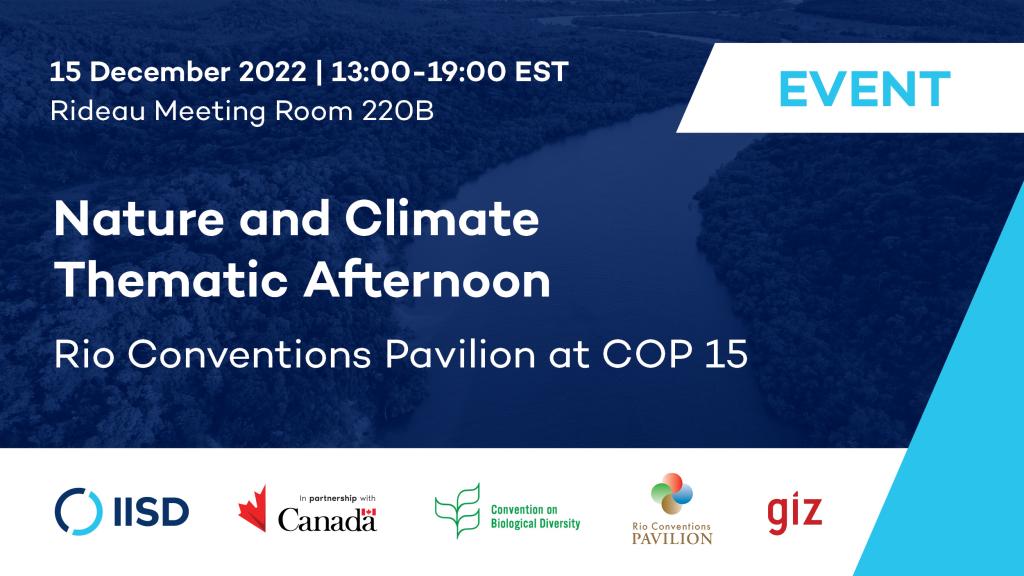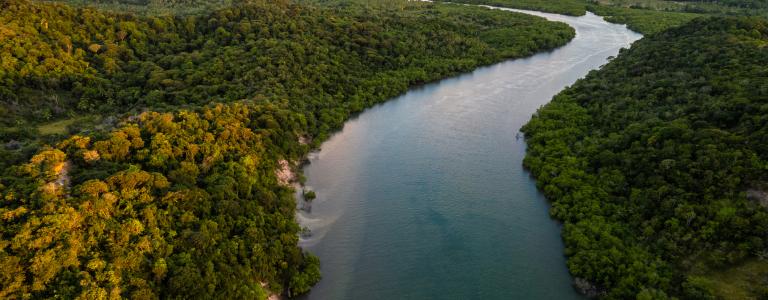COP 15 | Rio Conventions Pavilion: Nature and Climate Thematic Afternoon
Watch the livestream recording here.
View highlights and images from the event here.
Description
The Nature and Climate Thematic Afternoon at the COP 15 Rio Conventions Pavilion will feature a series of sessions highlighting the importance of synergies between biodiversity conservation and climate adaptation for the successful implementation of the Global Biodiversity Framework (GBF) and the scaling-up of climate and nature initiatives.
This thematic afternoon is hosted by the International Institute for Sustainable Development (IISD), the Convention on Biological Diversity (CBD), Global Affairs Canada (GAC) as part of the Nature for Climate Adaptation Initiative funded by the Government of Canada, and Deutsche Gesellschaft für Internationale Zusammenarbeit (GIZ). Financial support is also provided by the Nature-Based Infrastructure Global Resource Centre, the International Institute for Environment and Development, the United Nations Environment Programme World Conservation Monitoring Centre, and the International Union for Conservation of Nature (IUCN).

Agenda
High-Level Opening of the Nature and Climate Thematic Afternoon at the Rio Conventions Pavilion
13:00–13:30 | IISD, CBD, GAC, and the Government of Germany
The opening session will launch the Nature and Climate Thematic Afternoon at the COP 15 Rio Conventions Pavilion, with high-level remarks from IISD, CBD, GAC, and the Government of Germany on the role of social inclusion, gender equity, and biodiversity net gain in nature and climate initiatives for the successful implementation of the GBF.
Enhancing Synergies Through Climate, Biodiversity, and Sustainable Development Actions
13:30–14:50 | SwedBio, CBD, GIZ, IISD, and Friends of Ecosystem-based Adaptation (FEBA)
Sustainable development, biodiversity conservation, and climate change are inextricably linked and interconnected fields. The realization of synergies and building strategic linkages and coordinating actions could increase the effectiveness of different actions and related goals. Pursuing synergies will enable the smart use of resources and improve the quality of planning while strengthening positive synergies in implementation processes and magnifying the impact. It will likely minimize potential conflicts and the counterproductive implementation of measures, achieving joint Rio Conventions goals more efficiently and effectively.
This session will highlight newly prepared guidance and case studies developed by SwedBio, the CBD, the UNFCCC, GIZ, IISD, and FEBA on the realization of synergies between climate change, biodiversity, and sustainable development. There will be Q&A opportunities and exchanges between panellists and the audience to discuss strengthening the synergies between the Rio Convention processes and country-level implementation.
From Plan to Project: The role of NBSAPs and NAPs in scaling nature-based infrastructure projects
15:00–16: 15 | Nature-Based Infrastructure Global Resource Centre, Global Environment Facility (GEF), and National Adaptation Plan Global Network (NAP GN)
This session will discuss the potential role of National Adaptation Plans (NAPs) and National Biodiversity Strategies and Action Plans (NBSAPs) in promoting and scaling up nature-based infrastructure (NBI). The panel of experts will explore key questions, including:
-
What opportunities do the NAP and NBSAP processes provide for supporting and scaling NBI?
-
What are some common limitations that must be overcome in the NAP and NBSAP processes to accelerate the implementation of NBI?
-
How can we ensure NBI is gender responsive and socially inclusive—and what role should the NAP and NBSAP processes play to ensure this is achieved?
Coffee Break
16:15–16:30
The Role of Protected Areas in Climate Adaptation
16:30–17:45 | IISD, World Wide Fund for Nature (WWF) Africa, Wildlife Conservation Society (WCS), Parks Canada, and the International Indigenous Forum on Biodiversity
This session will explore challenges and opportunities for protected areas (PAs), Indigenous Peoples’ and community conserved areas and territories (ICCA), and other effective area-based conservation measures (OECM) management. It will also examine their contributions to community and ecosystem resilience and the important role of Indigenous-led spatial management and conservation in achieving targets under the GBF. Panellists from WWF Africa, WCS, Parks Canada, and the International Indigenous Forum on Biodiversity will discuss on-the-ground experiences in different regions, including both marine and terrestrial protected areas.
Movies and Marketplace at the COP: Scaling up nature and climate initiatives
18:00–19:30 | GAC, IISD, GIZ, IUCN, United Nations Development Programme (UNDP), and United Nations Environment Programme (UNEP) and the Partnership for Environment and Disaster Risk Reduction (PEDRR)
For the final session, participants will have an opportunity to kick back with popcorn and watch a series of videos and short presentations on online learning tools developed by IISD, GIZ, IUCN, UNDP, and UNEP PEDRR to scale up nature and climate initiatives. Participants will then be invited to venture through the marketplace, mingle with the organizations, and ask questions, network, and share experiences.

Upcoming events
Building Bridges: The State of Nature-Based Investments
Join us for a panel at the Building Bridges conference in Geneva, Switzerland, to discuss the state-of-play of nature-based investments and the potential opportunities they present.
A Municipal Perspective on the Value of Natural Infrastructure
This webinar will showcase examples the cost-effectiveness of natural infrastructure from a municipal perspective. Focusing on what municipalities need—what evidence and numbers they rely on, and what tools and planning processes are required to ensure that natural infrastructure is assessed alongside traditional infrastructure for cost-effectiveness.
Through Her Lens: Women leading change in sustainable agriculture and market inclusion
Despite the critical role that women play in agricultural production, they still do not have equal access to global agricultural supply chains on terms that benefit them.
